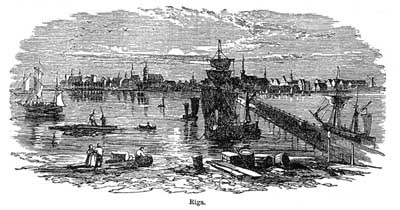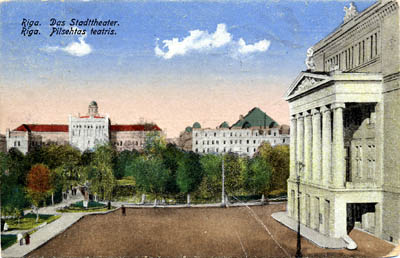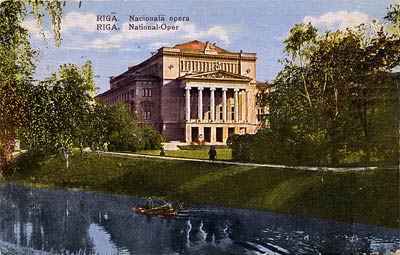

![]()
This page is also available in French
Berlioz only came once to Riga, on his return journey from his first trip to Russia in May 1847 (Riga at the time formed part of Russia). His stay there is known principally from a passage in the Memoirs and from a letter he wrote to Count Mikhail Wielhorski shortly after his passage there, both of which are cited below. The account in the Memoirs gives the impression that the concert Berlioz gave there (29 May 1847, probably at the theatre) may have been improvised by him on the spot. The composer’s letters suggest, however, that he had conceived the plan before his departure from St Petersburg on 22 May, and that General Lvov, himself a keen musician and composer, had provided him in St Petersburg with contacts in advance which he put to good use in Riga (cf. Correspondance génerale nos. 1110bis, 1112; hereafter CG for short). The account in the Memoirs (from the Sequel to the trip to Russia) is as follows:
[...] While travelling via Riga I had the peculiar idea of giving a concert there. The receipts barely covered the expenses, but I had the benefit of meeting several professional and amateur musicians of distinction, among them the Kapellmeister Schrameck, M. Martinson, and the manager of the postal service. This gentleman had expressed strong reservations about my plan for a concert: « Our little town », he said, « is quite unlike St Petersburg; we are traders and at the moment everyone here is busy with the selling of corn. Your audience will number at most a hundred ladies and not a single man ». He was wrong: I had a hundred and thirty two ladies and seven men. In fact I believe that in all I made a profit of about three silver roubles (12 francs). This same manager claimed that I did not have the physique to match my profession: « Sir, you do not look to me like an ill-intentioned man », he would say, « and to judge from your feuilletons, of which I am an assiduous reader, I was expecting your appearance to be quite different. The devil take me if it is not with a pen that you write but with a dagger ». Well, the tip of my dagger is not poisonous and the precious villains I am so readily credited with slaughtering are still in fine health. One additional piece of good luck during my stay in Riga, which came as a complete surprise, was that the excellent German actor Baumeister was performing there, and I saw him play… Hamlet! [...]
The letter to Count Wielhorski, dated 1st June from Tilsitt, gives a broadly similar account and adds further details (CG no. 1113):
Since you show interest in my concert in Riga and wish to know how it went, here is a brief account of what happened. Schrameck the Kapellmeister combined the professional and amateur musicians of the city with a few players who came from Mittau and so he put together for me a small orchestra of some fifty men. They did a good job and even performed with remarkable fury the finale of Harold in Italy (the orgy of brigands), one of the most difficult pieces there is and which I regret not being able to let you hear in St Petersburg. As you can imagine there was no harp, and Schrameck simulated it on the piano. We put on the complete Harold in Italy (with an excellent solo viola), the overture Roman Carnival, two songs with orchestra, fairly well performed by a Miss Bamberg from the opera, the Concert of the Sylphs (without chorus!!!!) and the Hungarian March. The audience was very sparse but no less responsive. At the moment there are eleven hundred ships in the river of Riga, and everyone is busy selling or buying corn, from 8 in the morning till 11 at night. As a result there were only ladies in the hall, except for a very small number of men. Be that as it may I do not regret the fatigue involved in putting on the concert nor the time that I have lost, because of the display of enthusiasm on the part of this orchestra I did not know; I believe I can now count them among my devoted supporters. Incidentally, you do not know the great good fortune that was awaiting me in Riga. Imagine that I saw a performance of Hamlet, the real Hamlet by Shakespeare, excellently played by an actor called Baumeister I had never heard of. As always, I was turned inside out by this marvel from the greatest of human geniuses; the English are right to say that after God it is Shakespeare who has created most… [...]
The performance of Hamlet will have been in German, a language which Berlioz did not know – but as with his first experiences of Shakespeare in Paris at the Odéon theatre in 1827, Berlioz’s sensitivity was able to overcome the language barrier.
One other event attended by Berlioz during his stay in Riga is not mentioned in the account of the Memoirs, nor in the earlier version of his Russian trip which he published in 1855-56 in the Magasin des Demoiselles, nor anywhere in his extant correspondence. But a passage from one of his feuilletons in the Journal des Débats (7 January 1853) reads as follows:
In Riga, a town that is far from famous, and is very cold, very distant, and very badly paved, I saw a delightful performance of the Marriage of Figaro. The theatre at Riga is about the same size as the Salle Chantereine [in Paris]; the stage was lit up with candles, real candles, at least small ones; the orchestra comprised 36 players conducted by M. Schrameck. Mozart’s masterpiece never gave me such pleasure.
How I blessed those decent men, those young and agreeable women, who just sang Mozart’s melodies as written, who conveyed directly what Mozart had expressed, who only sought to reproduce Mozart’s intentions, but whose singing, feelings and understanding were so true! And that small orchestra whose intonation was so true! And the conductor whose conducting was so true! Truthfulness, truthfulness!… I am not speaking of justice*, it is said to be blind, and I believe it is also deaf.[* There is in Berlioz’s French an untranslatable play on the words justesse (truthfulness) and justice.]
From Riga Berlioz went on to Berlin, where he gave a complete performance of the Damnation of Faust.
![]()

We are most grateful to Silvija and Peters Vecrumba for granting us
permission to reproduce this engraving from their site: http://www.latvians.com.
They very kindly provided us with a large copy of the engraving at high resolution.![]()
![]()
The German (City) Theatre, now the National Opera, dates back to 1782 when it first opened its doors. Wagner was its musical director from 1837 to 1839. A new theatre, designed by the architect Ludwig Bonstedt (1822-1885), was built on the site of the old German theatre as a National Theatre and opened in 1863. After a fire in 1882, the theatre was rebuilt to its current state. The theatre became the National Opera House in 1919, and the National Theatre moved elsewhere.


These two old postcards are from our own collection.![]()
![]()
Page Berlioz in Riga created on 1 April 2005, enlarged on 15 October 2010.
© (unless otherwise stated) Monir Tayeb and Michel Austin for all the photos, engravings and information on Berlioz in Russia pages.
Copyright notice: The texts, photos, images and musical scores on all pages of this site are covered by UK Law and International Law. All rights of publication or reproduction of this material in any form, including Web page use, are reserved. Their use without our explicit permission is illegal.